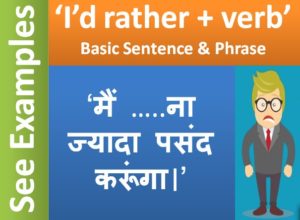The simple present tense is used when stating general facts or true statements that have no time. We use the base form of the verb to make simple present tense when using you, they, we and I.
- You wash the car.
- I wash the car.
- They wash the car.
- We wash the car.
Add -s to the verb for subjects (he, she, it and singular noun)
- He needs a roommate.
- She needs a blanket.
- It needs a lot of work
- John needs money.
Add -es to verbs when using he, she, it and singular noun if the verb:
- ends with z, s, x, ss, ch, or sh
- ends with o
- ends with y preceded by a consonant—change the y to i before adding -es
Here are some examples of the above rules:
- He washes the car
- She goes to school.
- He tries very hard.
- My cat scratch the furniture.
Simple Present Tense
To Be
The verb to be describes the identity, qualities, or condition of a person or object. Use the following to form the present tense of the verb to be.
- I am : I am serious.
- You are : You are my friend.
- She is: She is busy.
- It is : It is wrong.
- They are : They are good.
- We are : We are happy.
1. Simple Present Tense: Positive Sentence
- I am ready.
- She is my friend.
- They are twins.
- The flowers are yellow.
- The flashlight is in the tent.
- The fridge and counter in the kitchen are dirty.
- I am tired today.
- We are busy.
- The toys are in the basement.
- The ribbons in my hair are pink.
- The kitchen is very small.
- The vacuum is in the closet.
- He is nice.
- The microwave oven is in the kitchen.
2. Simple Present Tense: Negative Form
Place not after the verb to be to create the negative form of the present tense. Some examples of the negative form of the simple present tense are:
- She is not my sister.
- My neighbors are not Spanish.
- My sister-in-law is not Italian.
- Diane is not pregnant.
- The limes are not sour.
- The bus is not empty.
- The kids are not early for class today.
- The drawers are not empty.
- It is not a nice city.
- You aren’t a student.
- She isn’t happy.
- I am not ready.
Simple Present Tense: Question Form
Place the verb to be before the subject to create the question form of the simple present tense.
- Is the bus empty?
- Is he your teacher?
- Is it expensive?
- Are you serious
Simple Present Tense
To Have
Here are some examples of the positive form of simple present tense using the verb ‘have‘.
- The cat has white paws.
- I have a peanut butter sandwich for lunch today.
- Maria has a red velvet skirt.
- We have a nice landlord.
- Jessica has a terrible headache.
- We have a good housekeeper.
- She has a lot of dandruff.
- Tony has very good skills.
- The milk has a weird taste.
- The house has a green roof.
- It has a short tail.
- We have a day off next week.
- I have a warm sleeping bag.
- My sister has purple eye shadow.
Place do not or does not before the verb to have to create a negative sentence. It is important to note that have is always used in the negative form and never has.
- We don’t have a satellite dish on the roof.
- I don’t have a surprise for you.
- Jimmy doesn’t has a fast snowmobile.
- We don’t have many good books about antique jewelry.
- She doesn’t has a lot of customers.
- My brother-in-law doesn’t has a screwdriver.
- The clown doesn’t has a big red nose.
- I don’t have long straight hair and bangs.
- She doesn’t has fantastic news.
Place do or does before the subject to create questions with the verb to have. As with the negative form, have is used for all persons and never has.
Some examples of question form are:
- Do you have a pink eraser?
- Does he have my phone number?
- Do they have everything they need?
- Do we have the same scarf?
Excercise:1
Rewrite the following sentences using does not or doesn’t with singular subjects and do not or don’t with plural subjects to express the negative form of the simple present tense.
1. My husband snores every night.
2. I believe your story about the giant monkeys.
3. Nancy and Yvan collect coins.
4. She speaks several foreign languages.
5. It dislikes fish.
6. Ron swears and yells in class.
7. Sara sells sewing machines.
1. My husband does not snore every night.
2. I don’t believe your story about the giant monkeys.
3. Nancy and Yvan don’t collect coins.
4. She doesn’t speak several foreign languages.
5. It does not dislike fish.
6. Ron doesn’t swear and yell in class.
7. Sara doesn’t sell sewing machines.
Excercise:2
Rewrite the following sentences to create the question form of the present indefinite tense.
1. She skates in the morning.
2. They boil the vegetables.
3. He sleeps in the afternoon.
4. The boys play chess at night.
5. You pay the mortgage on time.
6. She reads the English newspaper.
7. They drive to work together.
1. Did she skate in the morning?
2. Do they boil the vegetables?
3. Does he sleep in the afternoon?
4. Do the boys play chess at night?
5. Do you pay the mortgage on time?
6. Does she read the English newspaper?
7. Do they drive to work together?
